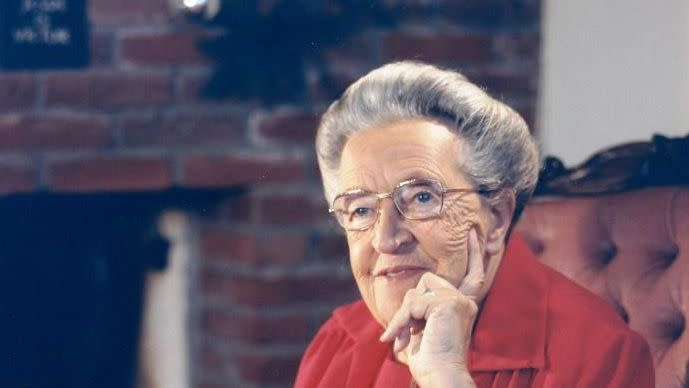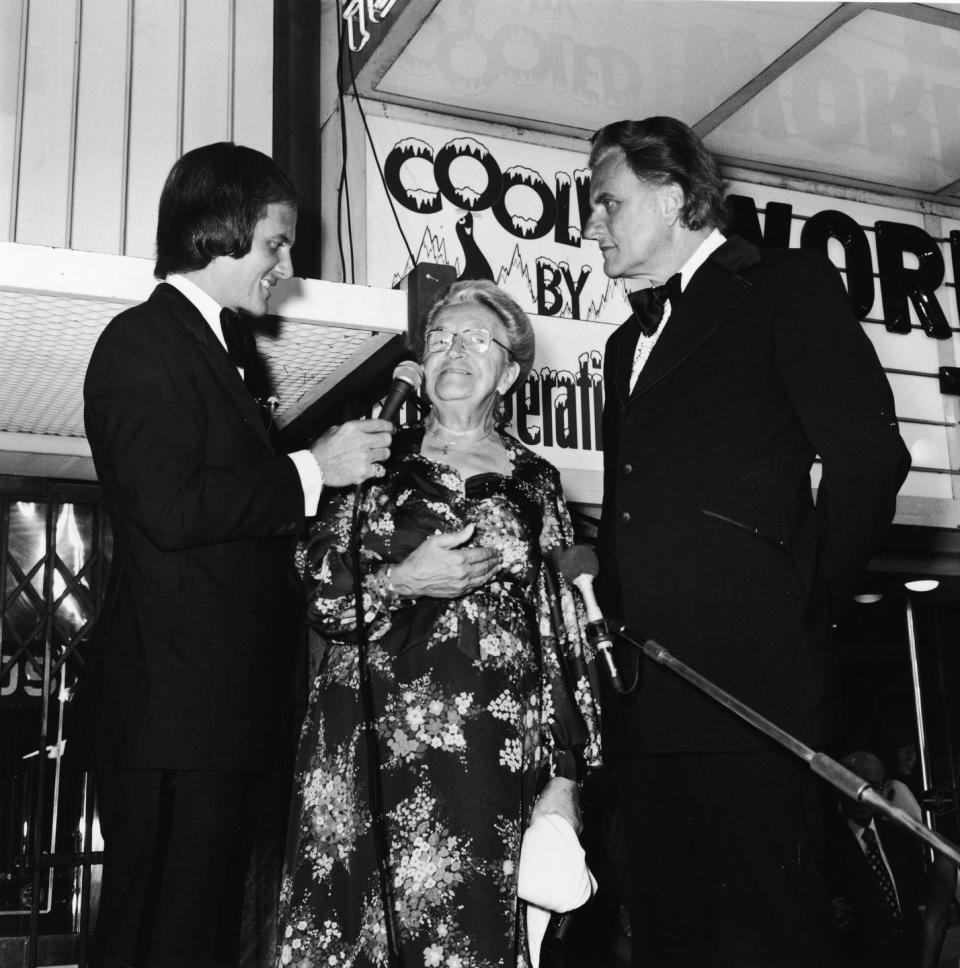Corrie ten Boom’s Remarkable Life Story Is Coming Back to Theaters in a New Movie

- Oops!Something went wrong.Please try again later.
- Oops!Something went wrong.Please try again later.
"Hearst Magazines and Yahoo may earn commission or revenue on some items through these links."
1892-1983
Latest News: 'The Hiding Place' Movie (2023)
A filmed stage performance adapted from Corrie ten Boom’s autobiographical book The Hiding Place, in which she recounts her and her family’s efforts to shelter Jews during the Holocaust, is coming to movie theaters this month. Nan Gurley stars as Corrie ten Boom, alongside Carrie Tillis and John Schuck. The new movie premieres in the United States on August 3 and 5, prior to its international release on August 16.
Who Was Corrie ten Boom?
Cornelia “Corrie” ten Boom was a Dutch watchmaker who, along with her family, harbored hundreds of Jews amid the Nazi Holocaust to protect them from arrest during World War II. It’s believed their efforts saved nearly 800 lives. Eventually betrayed by a fellow Dutch citizen, the entire family was imprisoned. However, Corrie survived and told her story in an autobiographical 1971 memoir The Hiding Place. Having grown up in a devoutly religious family, ten Boom also started a worldwide ministry and traveled around the world as a public speaker. She died in April 1983 on her 91st birthday.
Quick Facts
FULL NAME: Cornelia Arnolda Johanna ten Boom
BORN: April 15, 1892
DIED: April 15, 1983
BIRTHPLACE: Haarlem, Netherlands
ASTROLOGICAL SIGN: Aries
Early Life
Cornelia Arnolda Johanna ten Boom was born on April 15, 1892, in Haarlem, Netherlands, near Amsterdam. Known as “Corrie” all her life, she was the youngest child, with two sisters, Betsie and Nollie, and one brother, Willem. Their father, Casper, was a jeweler and watchmaker. Cornelia was named after her mother.
The ten Boom family lived in the Beje house in Haarlem (short for Barteljorisstraat, the street where the house was located) in rooms above Casper’s watch shop. Family members were strict Calvinists in the Dutch Reformed Church. Faith inspired them to serve society, offering shelter, food, and money to those in need. In this tradition, the family held a deep respect for the Jewish community in Amsterdam, considering them “God’s ancient people.”
Watchmaking Career
After the death of her mother and a disappointing romance, Corrie trained to be a watchmaker and, in 1922, became the first woman licensed as a watchmaker in Holland. Over the next decade, in addition to working in her father’s shop, she established a youth club for teenage girls, which provided religious instruction as well as classes in the performing arts, sewing, and handicrafts.
Efforts During World War II
In May 1940, the German Blitzkrieg ran though the Netherlands and the other Low Countries. Within months, the “Nazification” of the Dutch people began and the quiet life of the ten Boom family was changed forever.
During the war, the Beje house became a refuge for Jews, students, and intellectuals. The façade of the watch shop made the house an ideal front for these activities. A secret room, no larger than a small wardrobe closet, was built into Corrie’s bedroom behind a false wall. The space could hold up to six people, all of whom had to stand quiet and still. A crude ventilation system was installed to provide air for the occupants. When security sweeps came through the neighborhood, a buzzer in the house would signal danger, allowing the refugees a little over a minute to seek sanctuary in the hiding place.
The entire ten Boom family became active in the Dutch resistance, risking their lives harboring those hunted by the Gestapo. Some fugitives would stay only a few hours, while others would stay several days until another safe house could be located. Corrie became a leader in the “Beje” movement, overseeing a network of safe houses in the country. Through these activities, it was estimated that 800 Jews’ lives were saved.
Capture and Imprisonment
On February 28, 1944, a Dutch informant told the Nazis of the ten Booms’ activities, and the Gestapo soon raided the home. They kept the house under surveillance, and by the end of the day, 35 people—including the entire ten Boom family—were arrested. Although German soldiers thoroughly searched the house, they didn’t find the half-dozen Jews safely concealed in the hiding place. The six stayed in the cramped space for nearly three days before being rescued by the Dutch underground.
All ten Boom family members were incarcerated, including Corrie’s 84-year-old father, who soon died in the Scheveningen prison, located near The Hague. Corrie and her sister Betsie were remanded to the notorious Ravensbrück concentration camp, near Berlin. Betsie died there on December 16, 1944. Twelve days later, Corrie was released due to a clerical error.
Work and Honors After the War
Ten Boom returned to the Netherlands after the war and set up a rehabilitation center for concentration camp survivors. In the Christian spirit to which she was so devoted, she also took in those who had cooperated with the Germans during the occupation. In 1946, she began a worldwide ministry that took her to more than 60 countries.
She received many tributes during her lifetime, including being knighted by the queen of the Netherlands. The Yad Vashem Remembrance Authority honored ten Boom in December 1967 as one of the Righteous Among the Nations, or non-Jewish individuals who risked their lives to help Jews during the Holocaust. Other notable individuals to receive the honor are Varian Fry, whose actions inspired the Netflix series Transatlantic, and Oskar Schindler, whose story was adapted into the 1993 Steve Spielberg film Schindler’s List starring Liam Neeson.
'The Hiding Place' and Movie Adaptations

In 1971, ten Boom wrote a best-selling memoir about her experiences during World War II, titled The Hiding Place. Four years after its release, the book was made into a movie starring Jeannette Clift as Corrie and Julie Harris as her sister Betsie. The 1975 movie was produced by well-known evangelist Billy Graham.

The Hiding Place by Corrie ten Boom
$8.79
amazon.com
The book was also adapted into a stage show and a new movie, which is showing in select theaters before an international release in August 2023. The production stars Nan Gurley as Corrie and Carrie Tillis, the daughter of country music star Mel Tillis, as her sister Betsie. The updated screen version was commissioned in honor of Clift and filmed in Nashville, Tennessee.
Ten Boom also published another memoir about her life, In My Father’s House: The Years Before the Hiding Place, and wrote a series of other religious books.
Final Years and Death
In 1977, at age 85, ten Boom moved to Placentia, California. The next year, she suffered a series of strokes that left her paralyzed and unable to speak.
Ten Boom died on her 91st birthday—April 15, 1983. Her passing on this date evokes the Jewish traditional belief that states that only specially blessed people are granted the privilege of dying on the date they were born.
Quotes
Worry does not empty tomorrow of its sorrow. It empties today of its strength.
Never be afraid to trust an unknown future to a known God.
The measure of a life, after all, is not its duration, but its donation.
Happiness isn’t something that depends on our surroundings... It’s something we make inside ourselves.
Forgiveness is an act of the will, and the will can function regardless of the temperature of the heart.
Worry is a cycle of inefficient thoughts whirling around a center of fear.
Fact Check: We strive for accuracy and fairness. If you see something that doesn’t look right, contact us!
You Might Also Like

